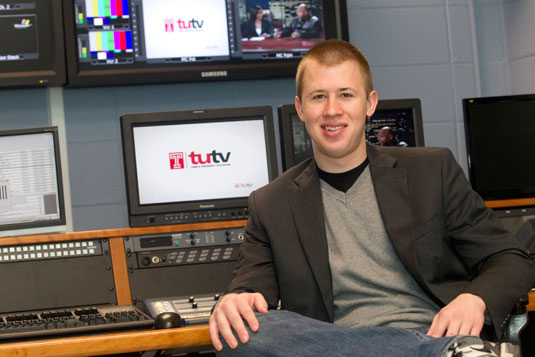Rosenbaum a driving force behind Temple-run TV station

If you’ve ever watched Comcast channel 50 in Philadelphia, there’s a good chance you’ve seen the work of the School of Communications and Theater’s Patrick Rosenbaum. The broadcasting, telecommunications and mass media major, the Birdsboro, Pa. native has been a driving student force behind programming on TUTV, Temple’s digital cable television station, which went on the air last August. As the station’s student executive producer, Rosenbaum is responsible for generating original programming, preparing content supplied by students and others within the Temple community and producing promotions. He’s taken the role very seriously, and has helped ensure continuity as he passes the reigns to another student this fall.
Temple Times: What spurred your interest in multimedia?
Patrick Rosenbaum: “I’ve always had an interest in computers and photography, and my family always had some of the latest equipment. I started playing around with my dad’s digital camera, and then got involved in my school’s video production program. I came to Temple as a film major, but quickly learned there are two different kinds of storytelling. I can tell a story in words and pictures, but filmmaking is a different brand of creativity. I’ve been very successful approaching that process as a student of broadcasting, television and mass media.”
TT: How has TUTV changed the student experience for broadcasting majors?
PR: It’s been really exciting. At first, students didn’t have an outlet where professional work could be showcased. We now have more opportunities for projects and productions. Plus, TUTV mimics a small market station, so it gives us a better experience of what running a television station is all about.
TT: What are some of the highlights from your Temple experience?
PR: There have been a lot. Because of TUTV, I’ve gotten to do so many other things. I shot for the men’s basketball team, and got to travel with them all expenses paid to Arizona to cover their NCAA tournament appearance. My footage was used on ESPN!
TT: What projects have given you the most satisfaction?
PR: I’m proudest of my basketball documentary project, which includes 25 minutes of highlights and interviews from throughout the season. I worked from about 1,500 clips and about 35 games at two hours each. The finished file was about 2 terabytes.
With TUTV, I’ve also done two or three broadcasts from the National Constitution Center — the last was on digital democracy — and we did another in-house at Annenberg Hall. My responsibility was to help produce the content, organize the equipment and crew, and serve as the main videographer.
TT: What have been some of your biggest challenges?
PR: Since TUTV was just starting out, the station was very repetitive — we were starving for content. I’ve helped lead a group that is finding content and helping to produce shows to program the station.
TT: What’s the biggest take-away from your Temple experience?
PR: It’s everything I thought it would be and a lot more. The side projects I’ve worked on gave me an opportunity most students don’t get. It’s been a special time at Temple.
TT: What do you plan to do next?
PR: I will continue to work at TUTV for the summer, while applying for jobs in sports broadcasting with sports production companies. Down the road I hope to land a senior position or become a production manager. Eventually I would like to own my own production company. I feel like I can do it all.
TT: How will you feel about leaving TUTV behind?
PR: I’ve mentored a couple of people who will help take it to another level. I feel that the future of the station is in good hands.
—Vaughn Shinkus